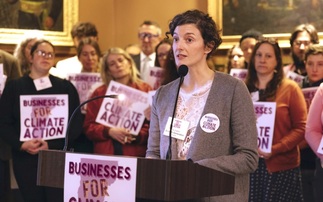France and Peru say countries are edging towards consensus over the shape of global deal, as Ban Ki Moon praises US Clean Power Plan
The United Nation's decision to ask countries to pledge greenhouse gas targets ahead of a global deal on climate change, has proved a "game changer" in driving momentum towards an agreement in Paris later this year.
That is the view of the Peruvian and French governments, hosts of the crucial UN climate change summits in 2014 and 2015 respectively, set out in a briefing document released late last week.
Over the course of this year, countries have been submitting their Intended Nationally Determined Contributions (INDCs) to the United Nations, outlining the post-2020 emissions reduction targets and climate action plans they intend to enact under a Paris climate change deal.
Some, critics argue this voluntary approach lacks the authority of a legally binding agreement, while scientists have warned the emissions reductions pledges made to date are well short of what is required to ensure a reasonable chance of limiting temperature increases to the internationally agreed 2C.
But in an aide memoire released at the end of last month, France and Peru declared the INDCs have been instrumental in driving progress towards a deal. "The world is no longer one where only some parties are acting," the countries wrote.
The document outlined the main discussion points from the first informal ministerial meeting in Paris last month between diplomats from a number of key countries and UN leaders. It concludes that the talks remain on a positive footing and stand an increasingly good chance of delivering a new international climate change treaty.
"Today, all parties are implementing meaningful measures and policies on both mitigation and adaptation," the text states. "The concept of nationally-determined contributions is a game-changer that will enable universal participation to be fully reflected in the new agreement."
Analysis of the INDCs announced so far suggests they already cover 52.4 billion tonnes of emissions across nearly 60 per cent of the global economy.
However, the aide memoire notes that establishing a mechanism to ensure countries ratchet up their targets after Paris will be crucial to the success of any deal.
Significantly, the document suggests reviews of targets should take place once every five years. However, countries would only be called upon to upgrade their ambition in a bid to eventually bring emissions reductions into line with the 2C goal once a decade.
The meeting took place after the two co-chairs of the UN Climate Change Secretariat talks last month released the latest unofficial update to the Paris negotiating text, which saw them reorganise the text in an attempt to make it more concise. Critics argued the text still runs to an unwieldy 83 pages, while a host of issues, including the crucial topic of new sources of climate funding remain largely unresolved. However, the UN hailed the "streamlined" text as a "strong foundation" for the next round of talks.
France and Peru said there was now general agreement with the co-chairs that the text should have a core legally binding agreement, alongside a number of "COP decisions" that will not have legal force.
But the document also notes that ministers are continuing to express frustration at the slow pace of talks and underlines the need for clarity on how rich countries will deliver on their promise of $100bn of climate finance for vulnerable countries by 2020.
Ban Ki Moon hails "visionary" Clean Power Plan
In related news, the unveiling this week of US President Barack Obama's new Clean Power Plan won praise from UN Secretary General Ban Ki Moon, who said the regulations would boost the global economy and help tackle poverty.
Speaking after Obama confirmed the final details of the Clean Power Plan on Monday, which aims to reduce emissions from the energy industry by 32 per cent based on 2005 levels, Ban said the US has the ability to catalyse global efforts to tackle climate change.
He said the Clean Power Plan showed "hugely important and visionary leadership" from the US ahead of the Paris Summit in December.
The Clean Power Plan requires each of the 50 states in the US to develop a plan for reducing emissions from their power sectors. More than a dozen Republican states are already trying to sue the US Environmental Protection Agency (EPA) over the rules and the coal industry has warned that the rules will harm the economy and push up consumer power bills. However, the Obama administration remains confident the regulations can resist any legal challenge and is predicting the rules will unleash a significant new wave of clean energy and energy efficiency investment.
After a meeting with Obama in the Oval Office on Tuesday, Ban predicted the Clean Power Plan would generate "huge dividends" for the US and have a positive impact on the long-running global climate change negotiations, which have previously been hampered by accusations from poorer nations that the world's most powerful economy was failing to deliver effective climate policies.
"I'm sure that this will impact other countries," Ban told Obama. "And I really appreciate your personal engagement starting with China and Brazil and India, and many others, as I'm going to have some small-scale leaders meeting on the margins of the General Assembly."









